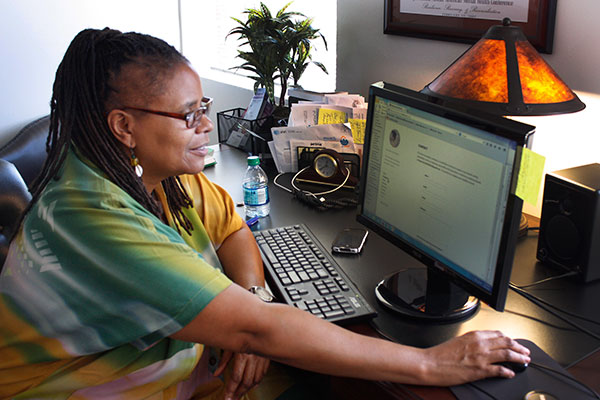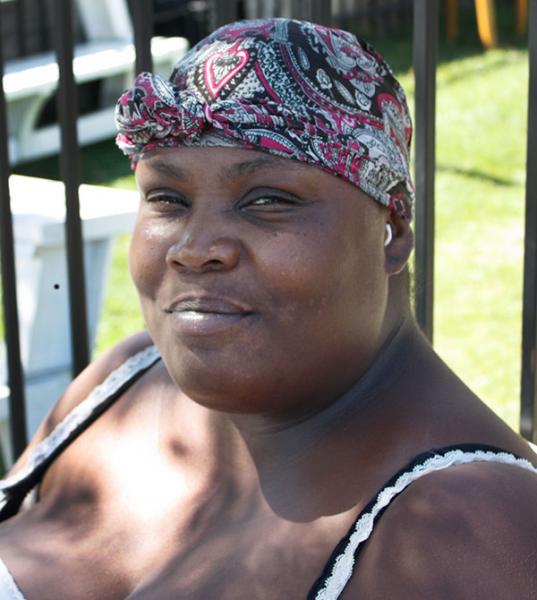Why Fewer Black Women Commit Suicide
Roshanda Burnett has tried to commit suicide four times over the course of her life. “As a child, I tried to kill myself. At 20 years old, I tried to kill myself because I was sick and tired of being sick and tired. It never worked,” said Burnett.
Burnett, now in her 30s, is a recovering addict who got clean with the help of services at Ruby’s House, a transitional living facility for women of color in Los Angeles. Despite her specific circumstances, Burnett’s despair is similar to that of other black women who have contemplated or attempted suicide, but did not actually kill themselves.
Suicide is the 10th leading cause of death in the United States. Nationally, women have a lower suicide completion rate of almost 5 percent, while men are looking at 17 to 20 percent suicide rates according to data from the Centers for Disease Control. But in the same period of time, African-American women have the lowest rate of suicide–1.7 percent–compared to all other U.S. demographic groups, such as white women, who have a rate of 5.18 percent.
The data for Los Angeles County is similar. An average of 11.5 African American women committed suicide each year between 2007 and 2012, contrasted with an average of 98 white women over the same period, according to numbers from the California Department of Public Health.
Mark Kaplan, a professor at the Luskin School of Public Affairs at UCLA, who has observed this significantly lower rate among black women, advocates for more research on what makes this group have such a low risk for suicide. Just looking at high-risk groups, he believes, presents an incomplete picture as to what cultural or social characteristics actually prevent it.
So why do African American women have significantly lower suicide rates? Can the reasons be unreservedly positive–that black women are more resilient–or is there something else at work that’s not apparent on the surface?
“We Let Women Pray”
“I was like ‘I don’t know who I’m praying to. But whoever you are, I need you to send me an angel, so I can get my life together,’” said Donna Guidry, on the night one year ago when she tried to kill herself while high on methamphetamines.
She had stood in the middle of a busy road for perhaps a full minute and was astonished when none of the cars speeding by hit her. “At that moment of clarity,” she said, “I just looked up.”
Guidry credits that act of God with not only saving her life but motivating her to get on a bus to Los Angeles to seek help. She has been sober for a year while living at Ruby’s House, the same facility that helped Roshanda Burnett.
Other women told how their religion, particularly their Christian faith, brought them back from the brink of suicide. For Michelle Taylor Greene, a photographer who struggled with depression and suicidal thoughts for 18 years, the prospect of going to hell was a powerful deterrent. “On a couple of occasions, [religion] stopped me, because I was already suffering on Earth, why would I want to suffer for eternity?”
“Black women are willing to use spirituality and spiritual means as a support,” said Ekwenzi Gray, a psychologist at Howard University who looks at mental health issues or other hardships that may place these women at risk for suicide.
The importance of spirituality has been adopted by organizations like Sistahfriends into their counseling services. “From the perspective of Sistahfriends, we believe that spirituality is integral to the health and well-being of women of color,” said Yolanda Whittington, a licensed clinical social worker and volunteer therapist at the organization. “If women decide to pray in a support group, we allow that and support that.”
“We Believe in Unity Around Suffering”
Whittington also cited a community support system as motivating black women away from suicide. “When we’re suffering, we come together as a group to provide that sense of support,” she said. “And I believe that lends itself to one not taking their own life because they know they have a support system that’s there for them. Particularly given what women of color, namely African-American women, may have gone through.”
Sistahfriends’ support groups try and replicate such systems. To Debra Mackey, director of Sistahfriends, these groups are modeled on when her mother used to take time to catch up with her girlfriends: “It’s just that circle of friends who are getting together and sharing, going out to dinner. It’s that family Sunday dinner where everybody’s together.”
READ MORE: Black Transgender Women Face Highest Suicide Rates

Many African American women face a cluster of socioeconomic hardships, such as single motherhood, workplace inequality and intimate partner violence. As a result, they often have access to community resources, neighborhood clinics for single mothers, support groups for working women, government aid and assistance close by.
By contrast, black women who are isolated from these services by their profession or socioeconomic status take their lives at a rate similar to that of white males, said Donna Holland Barnes, a suicidologist at Howard University and president of the National Organization for People of Color Against Suicide.
“She’s Needed and She’s Got to Continue”
Isolation is the leading risk factor psychologists identify as a precursor to suicide. This puts men more at risk than women, said Ekwenzi Gray, as men are socialized to be emotionally independent, whereas women are socialized as caretakers. African American women also have higher expectations of themselves being the sole family provider.
“It’s important to have something outside themselves to live for,” said Gray.
Although it can become a burden, being socialized to take care of others may carry women through tough times. “Unfortunately, or fortunately, the role of black women in the black communities doesn’t ever seem to end,” said Gail Wyatt, a psychologist at UCLA. “Because you never know when one of your children, or grandchildren, or friend’s children, or aunts, or uncles, is going to need you ... I think that all those things contribute to even in the hardest of times, a black woman getting up and realizing that she’s needed, and she’s got to continue.”
Debra Mackey stopped herself from succumbing to suicidal thoughts brought on by clinical depression because of her son, friends and family. “If my nieces and nephews who already told me they look up to me have an aunt who chose not to continue with this, what does that say in terms of their existence?”
Perhaps the most powerful protective factor is the most intuitive. “Everyone needs to feel connected and needs to feel a sense of purpose,” said Ekwenzi Gray. African-American women, who statistically are more likely to be single mothers, often say that they have too much depending on them to check out.
“I had a daughter,” Markei Shagy, Ruby House resident, said about considering suicide. “Somebody that depended on me, that needed me. She didn’t ask to be in this world.”
“It’s a Mark Against Us”
While black women have institutions and community characteristics that make them less susceptible to suicide, they must also contend with a stigma against mental health treatment. A National Institute of Health paper by Earlise C. Ward and Susan M. Heidrich cited a 2008 study, in which black women perceived those with depression as “having a ‘weak mind, poor health, a troubled spirit, and lack of self-love.’” As a result, few black women use mental health services, with only 7 percent of African-American women seeking clinical help when diagnosed with depression.
“Mental health can’t be discussed in the African-American community,” said Barnes. “There’s a stigma that it’s a mark against us, and we have so many marks against us, we don’t need more.”
There’s also a perception that clinical treatment is not for black women. Rev. Darlene Watley, the founder of Ruby’s House, said her transitional housing residents did not get the care they needed. Mental health professionals did not give them enough time and the women felt they were “just a number.”
She advocates for residents like Tiffany Birch, whom practitioners incorrectly diagnosed as schizophrenic, when she had bipolar disorder. She had to “fight that diagnosis” during subsequent times she sought help, while her family used this status as a means of taking her children from her custody. "They were trying to use this diagnosis to label me as unfit [to parent] or unstable,” said Birch.

“Black Women Are Not Superwomen”
The stigma also relates to the stereotype of the strong black woman. “I was diagnosed with depression [but] it was still a stigma for me, because we’re told that we’re strong, we take care of our own, I had the religious aspects going for me,” said Mackey. “But it was still there.”
The idea of the resilient black woman goes back to slavery, when the African-American community socialized black women to adopt that image to cope with immense hardship. “It’s the old expression,” said Barnes. “If you’re going to cry over a raindrop, what are you going to do when the rainstorm comes?”
The strong black woman trope “is also a risk factor for depression, just having to push so hard,” said her colleague Ekwenzi Gray. “We hear anecdotally, [black men] have to do twice as much to be half as good.” For [black women] who face both gender and racial inequality, “It’s three or four times as much.”
“Black women are not superwomen,” said Barnes.
For black women with mental health issues and past trauma who have attempted suicide, it’s a matter of finding reasons to continue living and seeking help. Resisting suicide is difficult, but not impossible. In the meantime, they’re still fighting. “I done tried everything to kill myself,” said Roshanda Burnett, the recovering addict. “It wasn’t for me to die. God got a blessing for me and I gotta do his work for him.”
READ MORE: VA Builds Sense of Community Among Vets To Lower Suicide
A few free/low-cost mental health resources for LA's diverse population.
View the story and all its social media components here.
This multi-media story was produced in collaboration with the 2014-2015 M.S. Graduate Program at USC's Annenberg School of Journalism.



